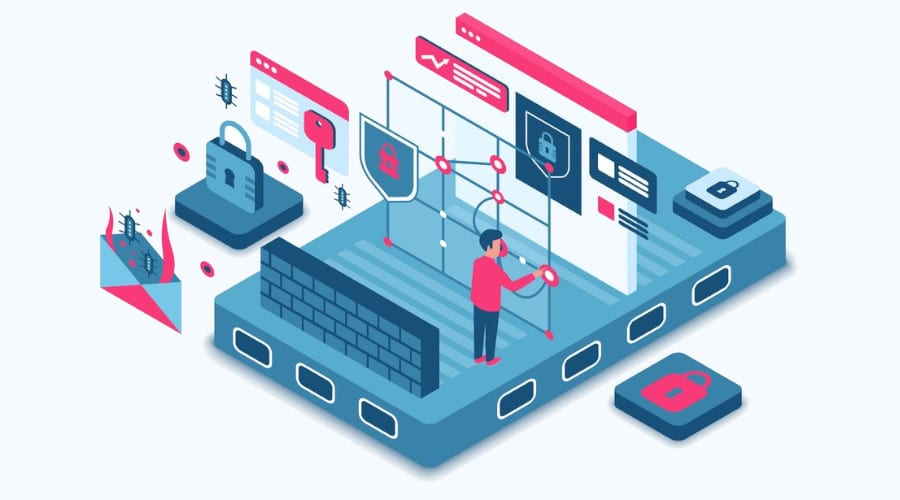The IT security administrator is an expert responsible for defining a company's cybersecurity policy, and ensuring its protection against malware and other attacks. Find out all you need to know about this essential job in a modern organization!
With cyberthreats increasing year on year, protecting IT systems and data has become a top priority for businesses.
Our society is increasingly connected, and the rise of technologies such as smartphones, social networks and the Internet of Things is opening up new opportunities for cybercriminals.
What’s more, the malware and other techniques employed by these hackers are also improving. And the criminal forums accessible via the Dark Web enable anyone to exploit them…
According to ANSSI, since 2020, cyber attacks have increased by 400% in France. On a global scale, the cost of cybercrime could double between 2023 and 2027, from $11,000 billion to $24,000 billion.
Faced with this new kind of danger, companies are recruiting experts from within their ranks to defend them. These specialists include IT security administrators.
What is an IT security administrator?
This professional specializes in protecting IT systems against internal and external threats, with the primary mission of ensuring data and infrastructure security. To achieve this, they implement appropriate protection measures.
Constantly vigilant in the face of cyber-attack risks, he monitors systems, analyzes vulnerabilities, and detects and prevents intrusions. In the event of a security incident, they must react immediately.
To achieve this, he or she must set up effective monitoring and intrusion detection mechanisms. It also manages security logs, and deploys measures to block unauthorized access attempts.
If an analysis reveals a potential flaw in the system, the administrator must implement patches and security measures to remedy it.
More generally, this expert is responsible for defining and implementing the company’s entire security policy. This includes establishing security rules, drawing up access control procedures, and managing digital certificates.
Within the organization, he or she must also provide training and awareness sessions to inform employees about good cybersecurity practices.
The aim is to make them understand the risks, train them in the safe use of tools and applications, and help them realize the importance of their role in data protection.

What skills do you need as a IT Security Administrator?
This highly responsible job requires a wide range of technical skills, as well as personal qualities such as rigor, an analytical mind and a talent for problem-solving.A knowledge of operating systems such as Windows, Linux or macOS is essential to be able to effectively secure different IT environments.
Similarly, a thorough understanding of networks is essential to understand data flows, communication protocols and potential vulnerabilities. The administrator must be able to configure and monitor all networks in complete security.
He or she must also be a master of security protocols such as SSL/TLS and IPsec, able to understand how they work and configure them correctly.
Tools for ensuring system security, such as firewalls and intrusion detection systems, hold no secrets for him. He can manage them and analyze the alerts they generate.
He also masters the principles of cryptography and data protection solutions such as encryption keys.
How can I train to become an IT security administrator?
A solid background in computer science is a prerequisite for this demanding profession. Degrees in software engineering or cybersecurity are also invaluable.
The best way to quickly acquire the required skills is to take an online course in the form of a BootCamp or continuing education.
In addition, it is advisable to obtain recognized professional certifications in the field of IT security.
Among the most highly valued examples are the Certified Information Systems Security Professional (CISSP) or the Certified Information Security Manager (CISM).
These exam-based credentials testify to the expertise of their holders, and help them stand out in the eyes of potential employers. The best training courses include certification.
Practical experience is also of great value in reinforcing theoretical knowledge. For example, doing an internship or taking part in real-life projects gives you an insight into the real challenges faced by cybersecurity professionals.
Once you’ve launched your career, it’s essential to continue training and keep abreast of the latest developments in this sector. This means attending conferences and upskilling courses.

The future of the IT security administrator
This profession demands a taste for challenge. Cyber-attacks are becoming increasingly sophisticated, and it’s getting harder and harder to fend them off. However, defense tools are improving, and artificial intelligence is providing invaluable support.
On the other hand, AI also brings new vulnerabilities and represents a new attack vector. Hackers, too, are using it to craft far more powerful malware or phishing attacks that are very difficult to detect.
In Europe, the protection of personal data is a particularly important issue, since companies are required to comply with the General Data Protection Regulation (GDPR) that has been in force since 2018. This imposes reinforced security measures.
Despite warnings deployed worldwide, many corporate employees continue to make mistakes that can compromise system security. The administrator’s duty to raise awareness is therefore a major priority.
The profession is evolving, and its role is no longer confined solely to protecting systems, but also to the organization’s overall security strategy. This requires coordination with all departments.
Data analysis is also playing an increasingly important role in the field of IT security, as it enables anomalies to be detected quickly, enabling instant reaction.
Conclusion: IT security administrator, between cybersecurity and data analysis
Without an IT security administrator, a company exposes itself to colossal risks, and sooner or later suffers a serious data leak.
That’s why these professionals are highly sought-after and highly paid. According to Talent.com, the median salary for this role is €40,000 a year.
Data analysis skills are essential for this profession. To acquire them, you can choose DataScientest.
Our various training courses enable you to learn how to handle all the tools required to become a Data Analyst, Data Scientist or Data Engineer.
You’ll learn about the Python language, DataViz and Business Intelligence solutions, Machine Learning techniques, databases and Data Engineering software.
All our training courses can be completed remotely and are eligible for funding options, leading to certification issued by MINES ParisTech PSL Executive Education or our cloud partners AWS and Microsoft Azure. Discover DataScientest!










